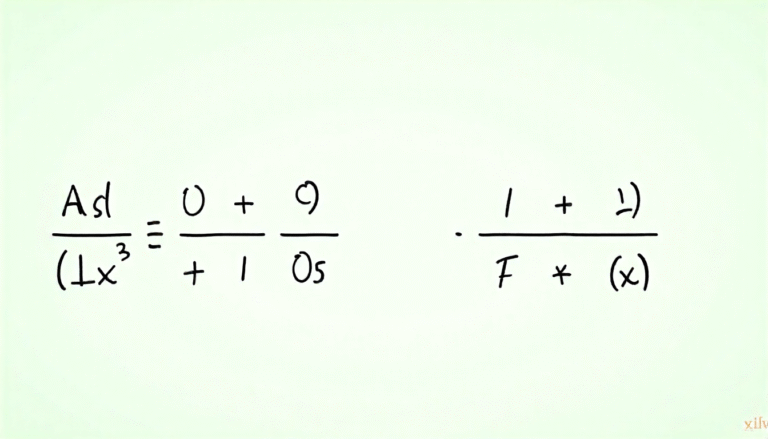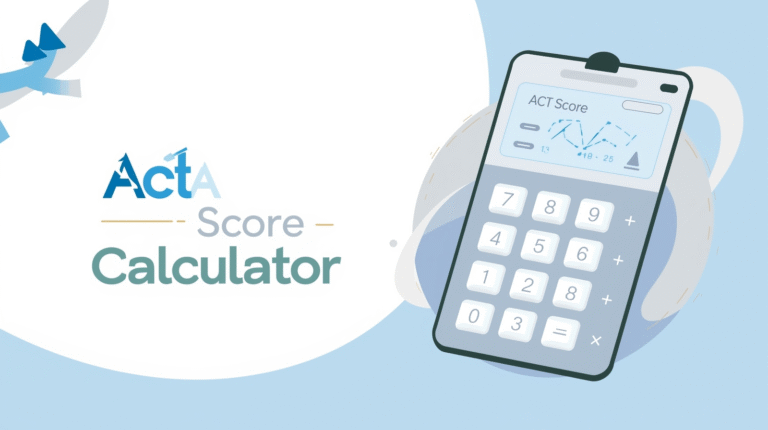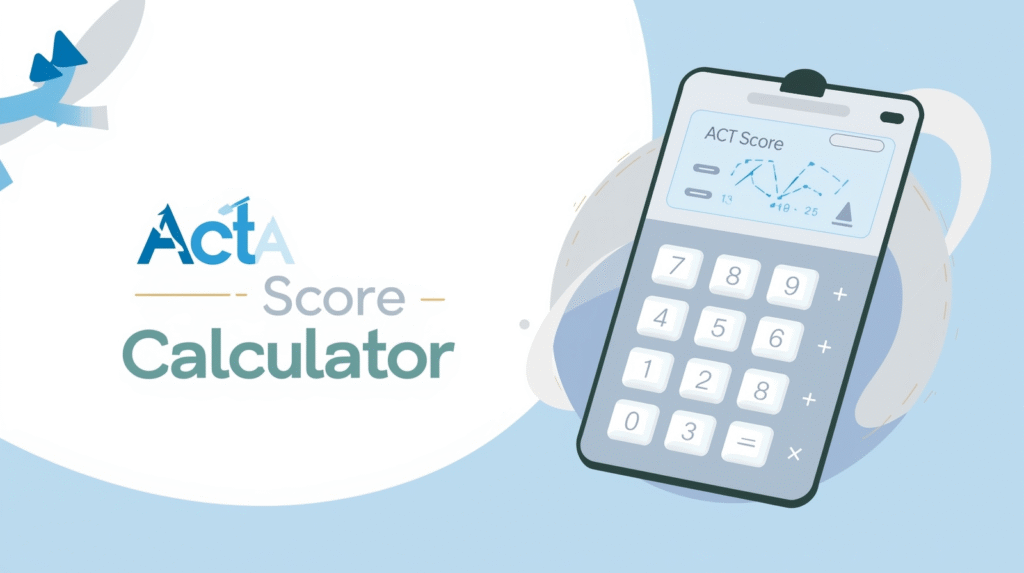
Have you ever finished an ACT practice test and wondered, “What does my score really mean?” You’re not alone! Many students find the scoring system confusing. That’s where an ACT score calculator becomes super helpful.
In this guide, we’ll walk you through everything you need to know about the ACT score calculator—how it works, how to use it, and how it can help you improve your scores. Whether you’re studying for the first time or retaking the test, this article will make the process easier, clearer, and maybe even a little fun!
Table of Contents
What Is an ACT Score Calculator?
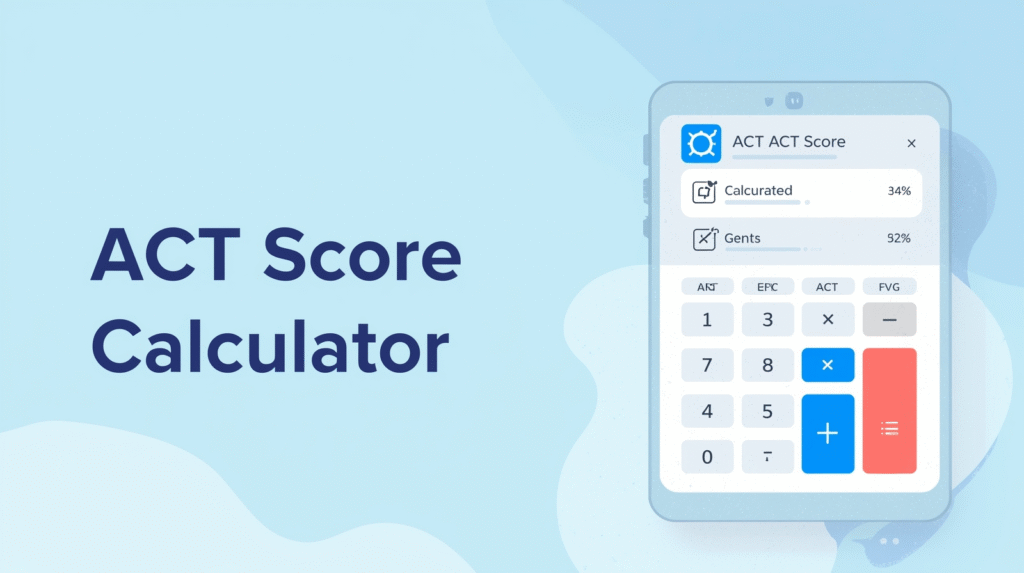
An ACT score calculator is a tool that helps you figure out your estimated ACT score before you take the real test. It turns the number of questions you get right into your “scaled score.”
The ACT is made up of four main sections: English, Math, Reading, and Science. Each section is scored between 1 and 36. Then, your overall or “composite” score is the average of those four numbers.
For example, if you score 28 in English, 30 in Math, 27 in Reading, and 29 in Science, your composite score is (28 + 30 + 27 + 29) ÷ 4 = 28.5, which rounds up to 29. An ACT score calculator does this math instantly for you!
Why You Should Use an ACT Score Calculator
Using an ACT score calculator can save time and reduce stress. After each practice test, you can quickly find out where you stand and what to focus on next.
Instead of guessing your performance, you’ll get a clear picture. This helps you set realistic goals and track progress over time.
It’s especially useful when you’re trying to hit a specific target score for college admissions or scholarships. Many students say seeing their calculated scores helps them stay motivated during their test prep journey.
How the ACT Is Scored (Made Simple)
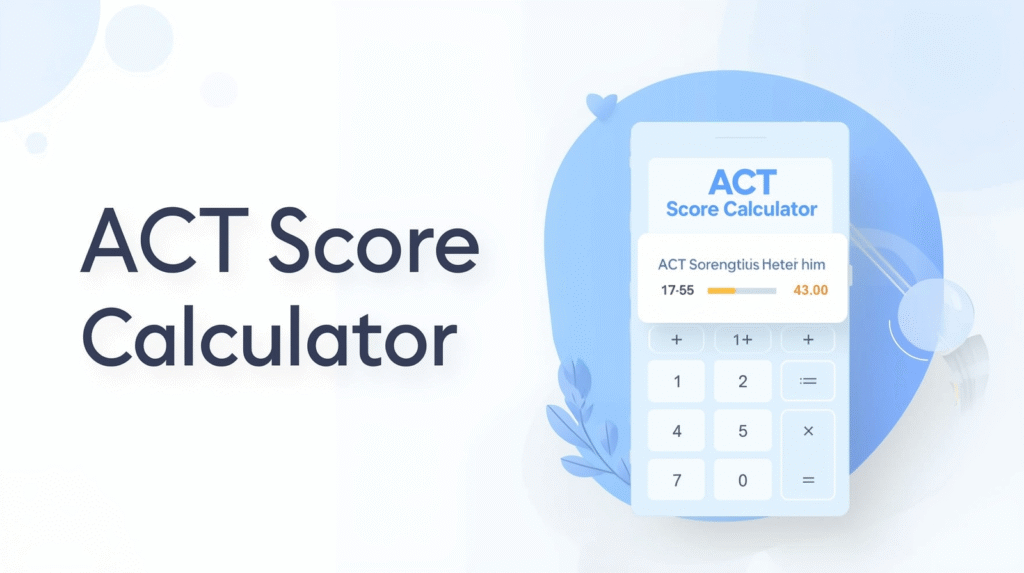
Let’s make ACT scoring easy to understand.
Each subject test has multiple-choice questions, and every correct answer gives you one point. Wrong answers don’t count against you, so there’s no penalty for guessing!
Once you have your raw score (the number of correct answers), the ACT organization converts it into a “scaled score” from 1 to 36. This scaling process adjusts for slight differences in difficulty between different test versions.
An ACT score calculator mimics this system so you can get a realistic idea of your scaled score from your raw one.
The Four Main ACT Sections and How They’re Weighted
To use an ACT score calculator effectively, it helps to understand what each section covers.
1. English
Covers grammar, punctuation, sentence structure, and writing style.
You’ll answer 75 questions in 45 minutes.
2. Math
Tests algebra, geometry, and basic trigonometry.
You’ll solve 60 questions in 60 minutes.
3. Reading
Checks your comprehension and ability to find key details in passages.
40 questions in 35 minutes.
4. Science
Tests your ability to read graphs, analyze data, and understand experiments.
40 questions in 35 minutes.
Each section counts equally toward your total score, so you can’t ignore any of them. Using a free ACT score calculator helps you see which subjects need extra work.
How to Use an ACT Score Calculator Step-by-Step
Ready to try it? Here’s how to use an ACT score calculator in just a few steps:
- Take a practice test. Be honest with timing to make results realistic.
- Count your correct answers in each section.
- Enter your raw scores into the calculator.
- View your estimated scaled scores for each section.
- See your composite score (the average of all four).
That’s it! You’ll get an instant idea of how you might perform on the official test.
Example: Calculating an ACT Score by Hand
Let’s walk through a quick example.
Say you got:
- English: 64 correct out of 75
- Math: 50 correct out of 60
- Reading: 35 correct out of 40
- Science: 32 correct out of 40
Using an ACT score calculator, you’d get approximate scaled scores like this:
- English = 30
- Math = 28
- Reading = 31
- Science = 27
Your composite score = (30 + 28 + 31 + 27) ÷ 4 = 29.
So your ACT score is 29, which is above the national average and considered strong for many colleges!
How the ACT Score Calculator Helps You Improve
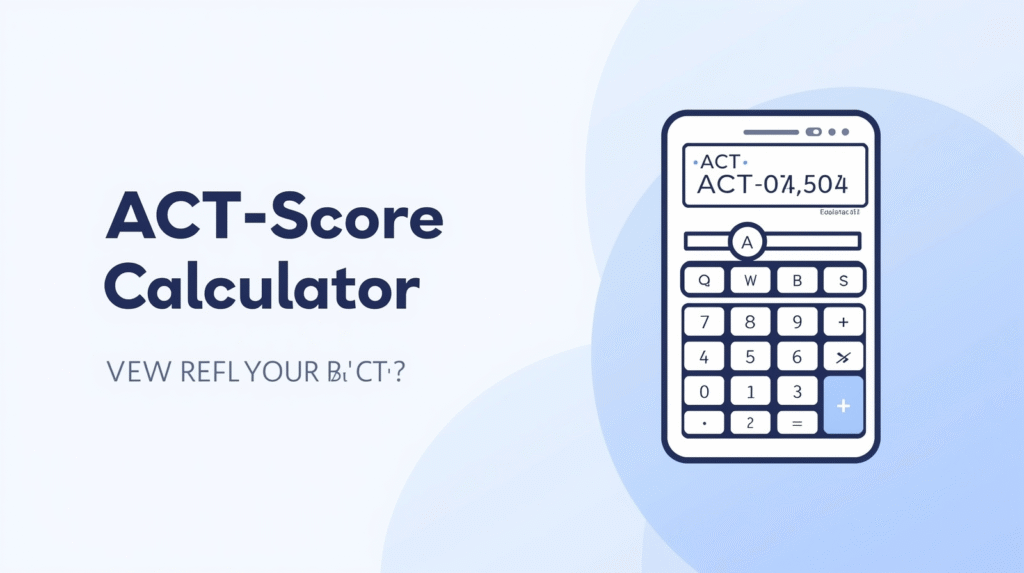
The ACT score calculator is not just a number-cruncher—it’s a learning tool.
When you use it after each practice test, you’ll notice patterns. Maybe your Math score is always lower, or your Reading score keeps improving. This tells you where to focus your study time.
You can set score goals for each section and track your progress. Watching your scores climb can be incredibly motivating. Some students even use an ACT score calculator weekly to measure their improvement.
Tips for Getting the Most Out of Your ACT Score Calculator
Here are a few quick tips to make your calculator results more meaningful:
- Always use official ACT practice tests. They’re the most accurate.
- Simulate real test conditions. Time yourself and avoid distractions.
- Record your scores in a notebook or spreadsheet.
- Analyze your mistakes. Don’t just look at the score—find out why you missed questions.
- Set goals. For example, aim to raise your composite score by two points each month.
These simple steps turn an ACT score calculator into a powerful prep tool.
Understanding ACT Percentiles
Your score isn’t just a number—it also tells you how you compare to other test-takers.
For instance:
- A score of 36 is the top 1%.
- A score of 30 puts you in roughly the top 5%.
- A score of 25 is about average.
Many ACT score calculators include percentile data so you can see where you stand nationally. This is helpful when setting realistic goals for your dream schools.
Real Student Example: How Maya Raised Her ACT Score
Let’s meet Maya. She started with a 22 on her first practice test. Using an online ACT score calculator, she tracked her progress weekly.
Each time she studied, she reviewed which sections needed improvement. After two months, her English went from 21 to 27, and her Math from 20 to 25. Her composite score jumped to 26, which made her eligible for a scholarship!
By using the ACT score calculator as her guide, she stayed focused, motivated, and confident.
Common Mistakes When Using an ACT Score Calculator
While ACT score calculators are great tools, they can be misused. Here’s what to avoid:
- Entering raw scores incorrectly. Double-check your numbers!
- Relying only on one test. You need multiple data points to see real progress.
- Ignoring weak areas. Don’t focus only on strengths.
- Using unofficial tests. Non-official tests may not match ACT difficulty levels.
Using the ACT score calculator correctly ensures you get accurate and helpful feedback.
Setting Target Scores with the ACT Score Calculator
Every college has its own average ACT range for admitted students. You can find these on their admissions pages.
Once you know your target, plug it into your ACT score calculator and see how close you are. Then, plan your prep around that goal.
For example, if your dream school’s average score is 31, and you’re currently at 27, you know you need to improve by about four points. That’s a clear, measurable goal!
The Best Free ACT Score Calculators Online
Here are a few reliable and free options to try:
- Princeton Review ACT Score Calculator
- Kaplan ACT Score Converter
- Magoosh ACT Practice Score Tool
- ACT.org’s Official Raw-to-Scaled Conversion Charts
These tools are trusted, easy to use, and updated regularly. Always double-check with the official ACT conversion charts for accuracy.
What About the ACT Writing (Essay) Score?
If you take the optional writing section, it’s scored separately on a scale of 2–12.
It doesn’t affect your composite score, but some colleges still look at it. An ACT score calculator usually focuses on the four multiple-choice sections, but you can estimate your essay score based on rubric guidelines from ACT.org.
How to Use Your ACT Score to Plan for College
Once you’ve used an ACT score calculator to find your score, it’s time to plan next steps.
- Compare your score with your target colleges.
- Decide if you’ll retake the test. A few points can make a big difference.
- Explore scholarship options. Many require certain ACT thresholds.
- Plan your timeline. If you need to boost your score, schedule another test date early enough for college deadlines.
Knowing your ACT score gives you control and clarity in the college planning process.
FAQs About the ACT Score Calculator
1. Is an ACT score calculator accurate?
Yes, most are very close to real results—especially when using official ACT raw score charts.
2. Can I use an ACT score calculator for superscoring?
Yes! You can enter your best section scores from multiple tests to find your superscore.
3. Does the calculator include the essay?
Usually not. It focuses on the four main multiple-choice sections. The essay score is separate.
4. What’s the average ACT score?
The national average is around 20–21. Scores above 25 are considered above average.
5. Can the ACT score calculator predict scholarships?
Indirectly, yes! Higher scores often qualify you for academic scholarships.
6. Where can I find an official ACT score calculator?
ACT.org offers conversion charts you can use as an accurate calculator for your raw scores.
Conclusion: Turn Your Practice into Progress with an ACT Score Calculator
Understanding your ACT score doesn’t have to be stressful. With an ACT score calculator, you can instantly see where you stand, track your progress, and set smarter goals.
The best part? You stay motivated because you can see your growth every time you practice.
Whether you’re aiming for your dream college or trying to earn a scholarship, this simple tool helps you take control of your journey.
So go ahead—grab your practice test, open an ACT score calculator, and start turning your hard work into results. You’ve got this!


